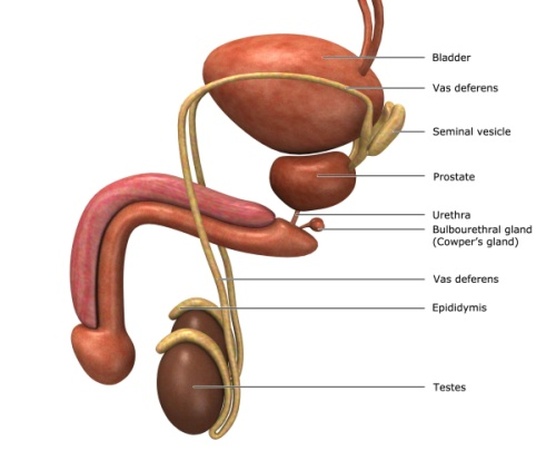New Prostate Treatment

Things you should know about prostate:
The prostate is a male sex gland and part of the reproductive system. Approximately the size of a walnut, the prostate is located just below the bladder. PSA (prostate specific antigen) is a molecule produced by the normal prostate and secreted in large amounts in the male semen, but is also normally present in minute quantities in the blood-stream.
What is prostate?
The prostate is a variable-sized gland located in the male pelvis, usually the size of a walnut measuring 3-4 cm long by 3-5 cm in width. The gland is found behind the pelvic bone, in front of the rectum, and below the bladder, surrounded by pelvic muscle.
The prostate surrounds the urethra which carries urine from the bladder to the penis and travels in the center of the gland. The seminal vesicles attach to the prostate and produce material that mixes with prostatic fluid to form semen. The tubes from the testicles carry sperm to the prostate where the sperm are mixed with the prostate and seminal vesicle fluid. This fluid is ejaculated during orgasm by a connection to the urethra called the ejaculatory ducts.
The prostate is a male sex gland and part of the reproductive system. Approximately the size of a walnut, the prostate is located just below the bladder. PSA (prostate specific antigen) is a molecule produced by the normal prostate and secreted in large amounts in the male semen, but is also normally present in minute quantities in the blood-stream.
What is prostate?
The prostate is a variable-sized gland located in the male pelvis, usually the size of a walnut measuring 3-4 cm long by 3-5 cm in width. The gland is found behind the pelvic bone, in front of the rectum, and below the bladder, surrounded by pelvic muscle.
The prostate surrounds the urethra which carries urine from the bladder to the penis and travels in the center of the gland. The seminal vesicles attach to the prostate and produce material that mixes with prostatic fluid to form semen. The tubes from the testicles carry sperm to the prostate where the sperm are mixed with the prostate and seminal vesicle fluid. This fluid is ejaculated during orgasm by a connection to the urethra called the ejaculatory ducts.
How often should I get checked?
Starting at age of 40, get checked once a year. If there is a detection in family members you may be concerned and get checked earlier.
What is the first step for detection?
The first step is to get a blood test done to check for the risk of prostate cancer. A normal test does not mean a man does not have prostate cancer, nor does an abnormal test measure the risk of prostate cancer to help your doctor detect cancer at an early point.
Many men may have an elevated PSA simply because they have benign enlargement of the prostate. Benign enlargement of the prostate will often produce an elevated PSA.
The PSA and rectal exam together are screening examinations which determine which men are at a significant risk for prostate cancer.
Symptoms of prostate trouble include:
Starting at age of 40, get checked once a year. If there is a detection in family members you may be concerned and get checked earlier.
What is the first step for detection?
The first step is to get a blood test done to check for the risk of prostate cancer. A normal test does not mean a man does not have prostate cancer, nor does an abnormal test measure the risk of prostate cancer to help your doctor detect cancer at an early point.
Many men may have an elevated PSA simply because they have benign enlargement of the prostate. Benign enlargement of the prostate will often produce an elevated PSA.
The PSA and rectal exam together are screening examinations which determine which men are at a significant risk for prostate cancer.
Symptoms of prostate trouble include:
- Impotency
- Erectile Dysfunction
- Frequent urination, especially at night
- Inability to urinate
- Trouble starting or holding back urination
- A weak or interrupted urine flow
- Frequent pain or stiffness in the lower back, hips, or thighs
- D.R. Scharenberg D.C. (Doc) has helped patients of all ages who suffer from male frequent urination, erectile dysfunction and other prostate symptoms .His main objective is the prevention of life-threatening ailments associated with the prostate by decreasing the inflammation and swelling of the organ using nutritional supplements and a chiropractic technique called digital rectal massage.
If you're suffering from male frequent urination or erectile dysfunction. Call our office at 316.945.0075 to set an appointment.
